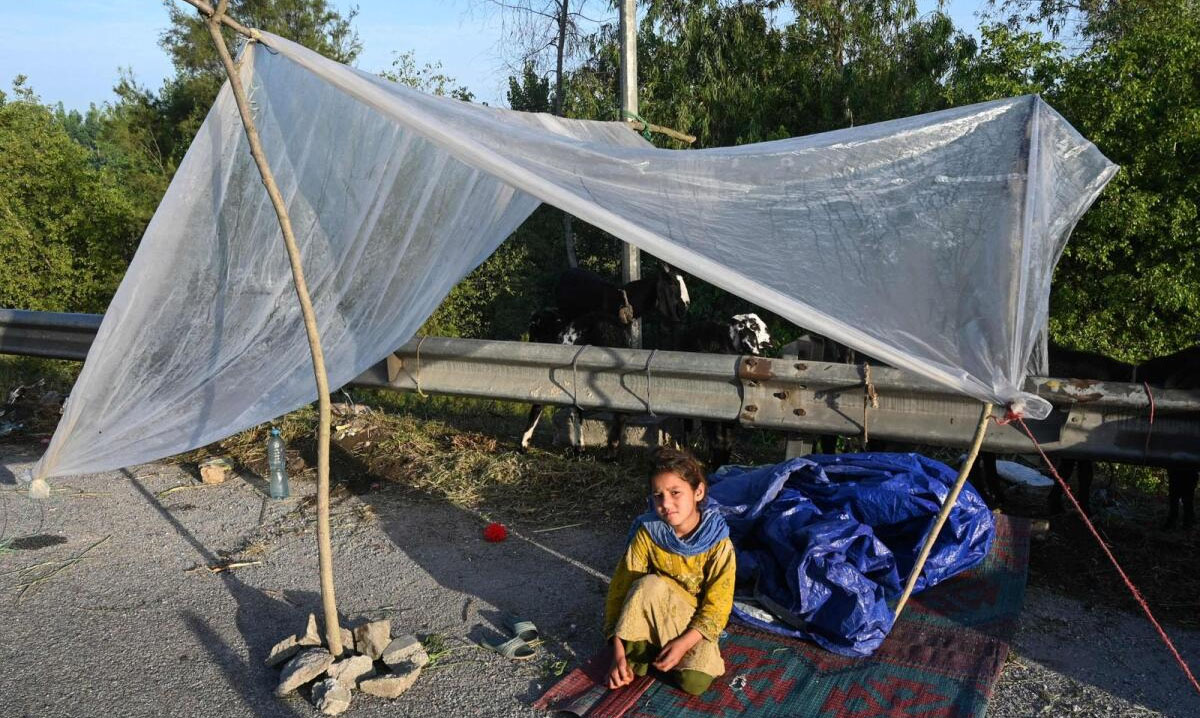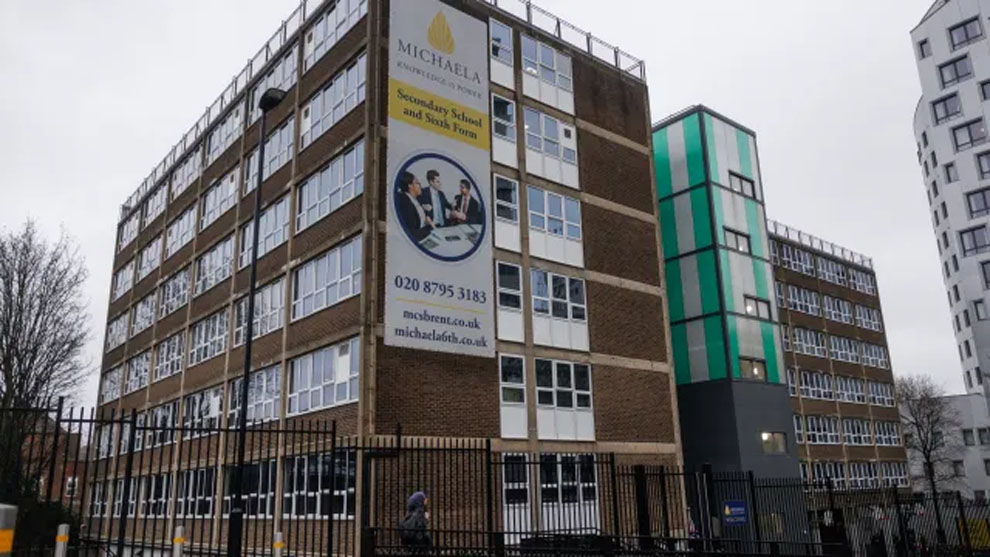International
Artemis 1: Nasa cancels moon mission launch over engine problem

Nasa is delaying a decision on the timing of its next launch attempt for Artemis 1, the US space agency’s first human-rated moon rocket in 50 years, after calling off Monday’s scheduled lift off late in the countdown because of an issue related to “engine bleed”
Engineers at Nasa’s launch complex in Cape Canaveral, Florida, discovered the problem with one of the four core-stage engines of the Space Launch System (SLS) rocket during overnight loading of 2.76m litres (730,000 gallons) of liquid hydrogen and oxygen fuel needed to send the spacecraft off on its 1.3m-mile, 42-day journey to the far side of the moon and back.
They were unable to find a fix in time to meet a two-hour launch window that opened at 8.33am (1.33pm BST) on Monday, and they are now troubleshooting the issue to assess readiness for the next available opportunity, on Friday 2 September.
“Friday is definitely in play. We just need a little bit of time to look at the data, but the team is setting up for a 96-hour recycle,” Mike Sarafin, Nasa’s Artemis mission manager, told a lunchtime press conference.
“We’re going to play all nine innings. We’re not giving up yet.”
Sarafin said no decision could be made until mission managers conducted a readiness review beginning on Tuesday afternoon, noting that he did not believe the problem was with the engine itself, but in the bleed system that “conditions” it with cryogenic propellant and adjusts the temperature for launch.
“The team… also saw an issue with a vent valve at the inner tank, so the combination of not being able to get the engine three chilled down and then the vent valve issue caused us to pause today, and we felt like we needed a little little more time,” he said.
READ ALSO:
- Lagos records 2 kidnap cases in 7 months — CP
- FG warns of fresh xenophobic attacks in South Africa
- Lifting 100m Nigerians out of poverty: FG kicks off project T-MAX in Lagos
Sarafin added that poor weather conditions at launchpad 39B at Kennedy Space Centre throughout Monday’s window would also have precluded the launch taking place.
The uncrewed Artemis flight is a crucial test mission designed to gauge the capabilities of the SLS rocket and six-person Orion crew capsule ahead of humanity’s planned return to the moon for the first time in half a century.
If Artemis 1 ultimately succeeds, astronauts will be onboard an interim test flight along the same route 40,000 miles beyond the moon and back, a trek scheduled for 2024. The first moon landing since Apollo 17 in December 1972 would follow a year or so later, with Nasa declaring it will carry the first woman to walk on the lunar surface.
Upwards of a quarter-million people flocked to Florida’s space coast on Monday to watch a moment in history now postponed to later this week, or even later in September or October, if engineers cannot quickly diagnose and address the cause of the engine bleed issue.
Problems with the rocket, which is made by Boeing, first arose during a “hot fire” test in January last year, when the engines shut down only one minute into a scheduled eight-minute run. The project at that stage was already almost three years behind schedule and $3bn (£2.55bn) over budget.
Critics say the ultimate cost to the US taxpayer of the Artemis programme, projected to reach $93bn (£79bn) by 2025, and which has longer-term goals of placing the first humans on Mars in 15 to 20 years’ time, cannot be justified.
But the Nasa administrator, Bill Nelson, a former space shuttle astronaut, said there was greater purpose in placing new human footprints in lunar soil now from those of the 12 men of the Apollo programme who did so over six missions in a past generation.
“We need to be on the moon for much longer periods of time than just landing like we used to, stayed a couple of days and left,” Nelson told NBC’s Meet the Press on Sunday. “This time we’re going back, we’re going to live there, we’re going to learn there. We’re going to develop new technologies, all of this so we can go to Mars with humans.
“All of this is to develop where we may be living on other worlds. They may be floating worlds, they may be the surface of Mars. But this is just part of our push outward, our quest to explore, to find out what’s out there in this universe.”
Nasa’s shuttle program, which was retired in 2011, limited crewed missions to lower Earth orbit, and subsequently private US space companies, including Elon Musk’s SpaceX and Jeff Bezos’s Blue Origin, have flown, or are planning flights, to the International Space Station orbiting about 250 miles above Earth.
Artemis is Nasa’s first deep-space exploration project for decades and, unlike the Apollo and shuttle programmes before it, relies heavily on outside contractors and international partners.
SLS is designed and manufactured by Boeing. The Orion crew capsule is the brainchild of Lockheed Martin. And the European Space Agency supplies the service module, the powerhouse of the spacecraft for its lunar journey once the powerful solid rocket boosters and core stage of SLS have placed it beyond Earth’s gravitational pull.
The ESM will push Orion farther from Earth than any human-rated space vehicle has ever flown before, providing electricity, water, oxygen and nitrogen and keeping the capsule on course and at the correct temperature before separating and burning up harmlessly in the atmosphere on its return to Earth.
International
Heavy downpours, lightning kill 65 in Pakistan

Heavy downpours, lightning kill 65 in Pakistan
At least 65 people have perished in storm-related accidents in Pakistan, including lightning, according to officials, with rain falling at roughly twice the historical average rate in April.
Heavy rains between Friday and Monday produced flash floods and collapsed houses, while lightning killed at least 28 people.
The highest death toll occurred in northwestern Khyber Pakhtunkhwa, where 32 people, including 15 children, died and more than 1,300 homes were damaged.
“All the casualties resulted from the collapse of walls and roofs,” Anwar Khan, spokesman for the province’s disaster management authority, told AFP on Wednesday.
Villagers whose homes were inundated with water were forced to seek refuge on higher ground, including on the shoulders of motorways, creating makeshift tents with plastic sheeting and bamboo sticks.
“In April, we have observed highly unusual rainfall patterns,” Zaheer Ahmad Babar, spokesperson for the Pakistan Meteorological Department, told AFP.
“From April 1st to April 17th, we experienced precipitation levels exceeding the historical average by 99 percent,” he added, citing data from the past 30 years as a comparison.
READ ALSO:
- EFCC has no powers to prosecute people over naira abuse – Odinkalu
- Stop Wike from using PDP for relevance, Secondus tells party leaders
- Court affirms Ganduje’s suspension as APC member
Most of the country experienced a pause in rain on Tuesday and Wednesday, but more downpours are predicted in the coming days.
“Climate change is a major factor behind these unusual weather patterns and above normal rainfalls, but it’s not just Pakistan which is affected, the whole region is experiencing changes in temperature patterns,” Babar added.
Pakistan is increasingly vulnerable to unpredictable weather patterns, as well as often destructive monsoon rains that usually arrive in July.
In the summer of 2022, a third of Pakistan was submerged by unprecedented monsoon rains that displaced millions of people and cost the country $30 billion in damage and economic losses, according to a World Bank estimate.
In the latest rains, 21 people including farmers harvesting wheat were killed by lightning in Punjab, Pakistan’s most populous province, provincial authorities said.
At least eight people were killed in Balochistan province, including seven struck by lightning, where 25 districts were battered by rain and some areas were flooded.
People living in open, rural areas are at greater risk of being struck by lightning during thunderstorms.
Schools in Balochistan province were ordered shut on Monday and Tuesday, with some reopening on Wednesday, because of the downpours.
At least four people were killed in road accidents linked to flooded roads in southern Sindh province.
Heavy downpours, lightning kill 65 in Pakistan
(AFP)
International
Israeli forces attack Gaza refugee camps, kill 18

Israeli forces attack Gaza refugee camps, kill 18
Eleven people, including children, were killed in an Israeli air strike on the Maghazi refugee camp in central Gaza as Israel continued to assault the Palestinian territories.
An Israeli jet attack on a residence in Rafah’s Yabna refugee camp was alleged to have killed seven more people, including four children.
ALjazeera had earlier reported that Gaza’s Civil Defence said “a number” of people had been killed and injured in the attack as they worked to pull the people injured, and the bodies of those killed, from under the rubble.
READ ALSO:
- Breaking: Saraki loyalist, Senator Rafiu Ibrahim, dies at 57
- Former female Boko Haram members cry for husbands
- PDP crisis: How G60 reps aborted pro-Wike camp’s plan to endorse Damagun
Meanwhile, Al-Jazeera Arabic shared video footage showing Israeli forces using heavy construction equipment to destroy the home of a Palestinian family in the town of Bani Naim east of Hebron city.
Earlier, Israeli forces used explosives and poured fresh concrete to destroy the family home of a killed Palestinian in the town of Beit Hanina, north of Jerusalem, the Wafa news agency reported.
Wafa also reported raids on homes in Tubas city in the north of the occupied West Bank.
Raids were also under way in Marda village, located north of Salfit city, and the town of al-Khader, south of Bethlehem.
A young Palestinian man was beaten by Israeli forces, then arrested during a raid south of Jenin, in the village of al-Fandaqumiya, according to Wafa.
Israeli forces attack Gaza refugee camps, kill 18
International
Muslim student loses High Court challenge against Michaela School’s prayer ban

Muslim student loses High Court challenge against Michaela School’s prayer ban
Michaela Community School in Wembley, led by headteacher Katharine Birbalsingh, insisted its approach promoted ‘inclusion and social cohesion between pupils’
A Muslim student at a London school once dubbed Britain’s strictest has lost a High Court challenge against its ban on prayer rituals.
The pupil, who cannot be named, took legal action against Michaela Community School in Wembley claiming its policy was discriminatory and “uniquely” affects her faith due to its ritualised nature.
In an 83-page judgment dismissing the student’s case, Mr Justice Linden said: “It seems to me that this is a case…where the claimant at the very least impliedly accepted, when she enrolled at the school, that she would be subject to restrictions on her ability to manifest her religion.
“She knew that the school is secular and her own evidence is that her mother wished her to go there because it was known to be strict.
“She herself says that, long before the prayer ritual policy was introduced, she and her friends believed that prayer was not permitted at school and she therefore made up for missed prayers when she got home.”
The judge upheld the student’s challenge to a decision to temporarily exclude her from the school.
READ ALSO:
- Naira records five-month highest gain, sells below N1000/$ at parallel market
- BREAKING: PDP secretary shot dead in his residence [PHOTO]
- NIMC issues 105 million NINs, targets 200 million in two years
Katharine Birbalsingh, the founder and headteacher of Michaela Community School, has hailed the ruling as a victory for all schools.
“The court’s decision is therefore a victory for all schools.
“Schools should not be forced by one child and her mother to change its approach simply because they have decided they don’t like something at the school.”
Education Secretary Gillian Keegan also welcomed the judgment on the free school’s prayer rituals ban.
She said: “I have always been clear that headteachers are best placed to make decisions in their school.
“Michaela is an outstanding school and I hope this judgment gives all school leaders the confidence to make the right decisions for their pupils.”
The case was heard at the High Court in January. Ms Birbalsingh, insisted its approach promoted “inclusion and social cohesion between pupils”.
She had planned to appeal the ruling if the school lost, telling the Sunday Times after the January hearing: “I will not divide children according to race and religion; it will not happen under my watch.”
The court was told the pupil, referred to only as TTT, was making a “modest” request to be allowed to pray for around five minutes at lunch time, on dates when faith rules required it, but not during lessons.
She argued the school’s stance on prayer – one of the five pillars of Islam – unlawfully breached her right to religious freedom and was “the kind of discrimination which makes religious minorities feel alienated from society”.
The policy was first introduced in March last year, the court heard.
Additional reporting by PA News Agency
Muslim student loses High Court challenge against Michaela School’s prayer ban
inews.co.uk
-

 metro7 days ago
metro7 days agoTroops arrest ISWAP commander involved in Army General, 3 soldiers’ killing in Borno
-

 News7 days ago
News7 days agoBREAKING: Ex-Abia gov, Ogbonnaya Onu, is dead
-

 Sports6 days ago
Sports6 days agoKane’s three children involved in car crash, hospitalised
-

 News5 days ago
News5 days agoFG gives update on where fleeing Binance executive is hiding
-

 Entertainment5 days ago
Entertainment5 days agoTolani Baj expresses love for Bobrisky
-

 metro5 days ago
metro5 days agoTroops neutralise 188 terrorists, rescue 133 hostages in assault operations
-

 metro5 days ago
metro5 days agoViral video: Edo CP orders trial of officer threatening people with gun
-

 News4 days ago
News4 days agoNLC, TUC jointly propose N615,000 new minimum wage






















